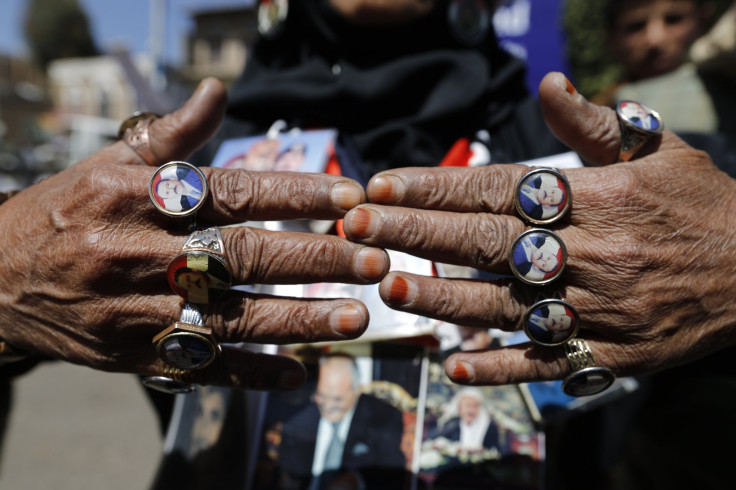Who Is Ruling Yemen? New Government Announced Amid Pro-Saleh, Houthi Protests in Sanaa

Yemeni president Abdo Rabbo Mansour Hadi announced a new, technocratic government on Friday as thousands of protesters, in solidarity with former president Ali Abdullah Saleh and the country's Houthi rebels, gathered in Yemen’s capital. Frustration from Yemen’s impoverished population paved the way for recent Shiite rebel gains that deepened the country’s sectarian divides, and threaten to start a proxy war with regional powers like Iran and Saudi Arabia.
The Saudi Arabia-backed Sunni president brought in 34 new ministers including Shiite Houthis, believed to have ties to the Iranian regime; members of the Herak group, a separatist group based in southern Yemen; and five women, including Nadia al-Saqqaf, who was appointed the first female Information Minister, the Associated Press reported.
The development came just hours before the United Nations was set to impose sanctions on two Houthi leaders and Saleh, whom the Security Council blamed for spurring protests opposing the government. The U.S.-sought sanctions will pass, provided no one on the Security Council opposed them, al-Jazeera reported. Protesters in Sanaa condemned the sanctions, which they claimed were American “interference” in the country’s affairs, according to the Associated Press.
Yemen’s already fragile political climate was thrown into further disarray in September when the Houthis overran the capital Sanaa and refused to leave until Hadi agreed to appoint a new cabinet. Weeks of violence followed the Houthi power grab, as the rebels clashed with Sunni tribes. Al Qaeda in the Arabian Peninsula (AQAP), a Yemen-based offshoot of the terrorist group, has been attacking the Houthi rebels, and consequently gaining the support from some of the country’s disaffected Sunni population.
The new parliament adheres to the Houthi’s demands for a more representative government but that may not be enough to stop the recent upswing in unrest, as several foreign governments want a say in Yemen’s future. Iran’s Shiite government is suspected of backing the Houthis, some even going as far as to claim Iran is molding the group in the shape of Shiite Lebanese militant group Hezbollah.
Both Iran and the rebels denied any relationship but their history tells a different story. In the mid-1990’s many Houthis were left Sunni-dominated Yemen and immigrated to Iran, including the group’s former leader Houssein al-Houthi. Many believe the Houthis came back to Yemen significantly more radicalized after their sojourn in Iran, but whether or not that was the regime’s doing is unknown.
“You have to know that the conspiracy is beyond any imagination. We were stabbed and we were betrayed from inside Yemen and outside,” said Hadi last month. “It is a cross-border plot where many forces allied together.”
Hadi’s Sunni administration is backed by Iran’s notorious rival Saudi Arabia and other Gulf States. A report published by Al Arabiya News in October accused Houthi leaders colluding with Saleh to sway the Saudi's back in his favor. The report said Houthi leaders asked Saleh to “deceive the Saudi leadership into believing that developments in Yemen were under control and that the Houthis can be removed from power if the kingdom entrusts him [Saleh] with this role.”
© Copyright IBTimes 2025. All rights reserved.






















